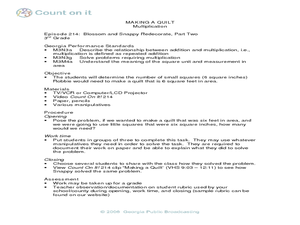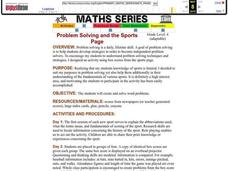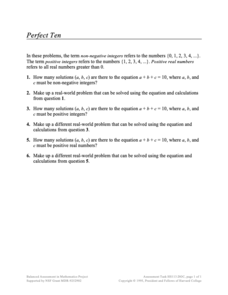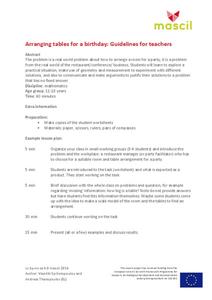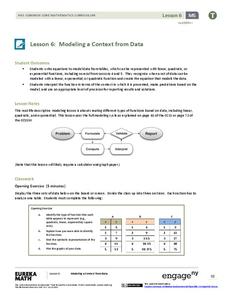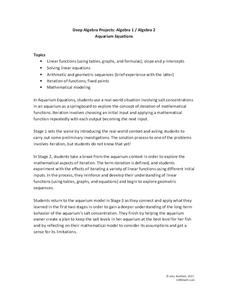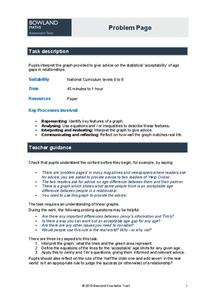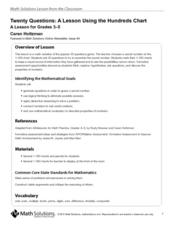Curated OER
Principles of Flight: Flying Paper Airplanes
Students investigate ways to enhance an object's flying ability. In this model construction lesson, students construct two paper airplanes, one of which is twice as big as the first. Students compare and contrast the two separate...
Curated OER
Shaking Up Ice Cream
Upper graders use a variety of tools to measure liquid and solid ingredients in an ice cream making recipe. Following written and oral directions and accurately timing themselves forms the basis of this instructional activity.
Curated OER
Handcarts - A Unique Form of Transportation
An interesting historical fact about how handcarts benefitted to the Mormon pioneers is the context behind this math lesson. Using given facts and figures regarding the handcart, pupil pairs create math word problems, share them with the...
Curated OER
Gone Lobstering
This simple lesson has young mathematicians consider all of the expenses, and monetary rewards a typical lobsterman encounters when going about his business. Given a few pieces of information, pupils must figure out a lobsterman will...
Curated OER
Make a Ten
Youngsters mentally perform calculations involving addition and subtraction. They solve various addition and subtraction word problems using mental math and counters, write their own number stories, and solve various examples...
Curated OER
Problem Solving with Multi-Step Number Stories
Pupils solve multi-step number stories. They create number models to solve number stories. Everyone chooses the appropriate operation to use after reading the problem, and then work in small groups to solve.
Curated OER
Making a Quilt: Multiplication
Third graders explore their multiplication skills. They will use their problem solving skills to solve an everyday math problem that requires them to multiply numbers. This lesson incorporates the use a video titled "Blossom and Snappy...
Curated OER
Problem Solving and the Sports Page
The use of box scores from baseball games is the foundation of this math lesson plan. Organize your class into groups of four, and give identical box scores from a baseball game that was just played. Have them create word problems from...
Curated OER
Speed and Acceleration
In this speed and acceleration worksheet, students complete math word problems having to do with speed and acceleration. Students complete 13 problems.
Curated OER
Maximum, Minimum, Increasing, Decreasing
Learners practice with the StudyCard set on assessing real-world contexts dealing with the concepts of maximum, minimum, increasing and decreasing. They view a variety of quadratic functions and equations with their TI-83 Plus calculators.
Curated OER
Patterns
Second graders work with different types of patterns. In this pattern activity, 2nd graders go to a pattern block webpage and use Unifix cubes to create their own patterns. They find patterns in the real world and draw their own examples.
Curated OER
Teaching with Collections
Students examine collections. In these real-world collections lessons, students examine and describe buttons and shells. Students will then sort, classify, and graph items according to various indicated descriptors.
Smithsonian Institution
Geometric Shapes Collage
Junior geometers practice stating the names of different geometric shapes. They define and name the different shapes and compare and contrast shapes to one another. They also relate the shapes to objects in the real world.
Concord Consortium
Perfect Ten
How many ways can you make 10? Class members tackle three problems to find all possible ways three numbers add to be 10. The first is with positive integers, secondly with non-negative integers, and finally with real numbers. Pupils also...
EngageNY
Logarithms—How Many Digits Do You Need?
Forget your ID number? Your pupils learn to use logarithms to determine the number of digits or characters necessary to create individual ID numbers for all members of a group.
Mascil Project
Arranging Tables for a Birthday
Planning a party of 45 guests may be more complicated than it would seem. Learners must design the space in accordance with these constraints about the space available in the room. They need to calculate area, circumference, and linear...
EngageNY
Modeling a Context from Data (part 1)
While creating models from data, pupils make decisions about precision. Exercises are provided that require linear, quadratic, or exponential models based upon the desired precision.
Mathematics Vision Project
Module 7: Modeling with Functions
The sky's the limit of what you create when combining functions! The module begins with a review of transformations of parent functions and then moves to combining different function types using addition, subtraction, and multiplication....
5280 Math
Aquarium Equations
Take a look at linear functions in a new environment. A three-stage algebra project first asks learners to model the salt concentration of an aquarium using linear functions. Then, using iterations, pupils create a set of input-output...
EngageNY
Graphing Quadratic Functions from Factored Form
How do you graph a quadratic function efficiently? Explore graphing quadratic functions by writing in intercept form with a lesson that makes a strong connection to the symmetry of the graph and its key features before individuals write...
Penn Museum
Penn Museum: China Gallery
Invite your learners to take a closer look at the art and mathematical function of dome buildings as designed by the ancient Romans. In the next segment of this attractive worksheet set, your young historians will then learn about...
Bowland
Problem Page
Future mathematicians use a given graph to answer a question about age differences in relationships. Along the way, they must find the equation and inequality of given graphs.
Curated OER
Multiplication Strategies - A Day at the Zoo
This is an amazing 33-page resource for teaching multiplication! Your mathematicians will discover the connection between multiplication and repeated addition. They also will work collaboratively with arrays while studying zoo animals....
Curated OER
Twenty Questions: The Hundred Chart
Use the 20 Questions game to practice math vocabulary and number properties! Project a hundreds chart and hand one out to learners. Ideally, give them counters (beans would work well) to mark off the chart so you can play multiple times....








